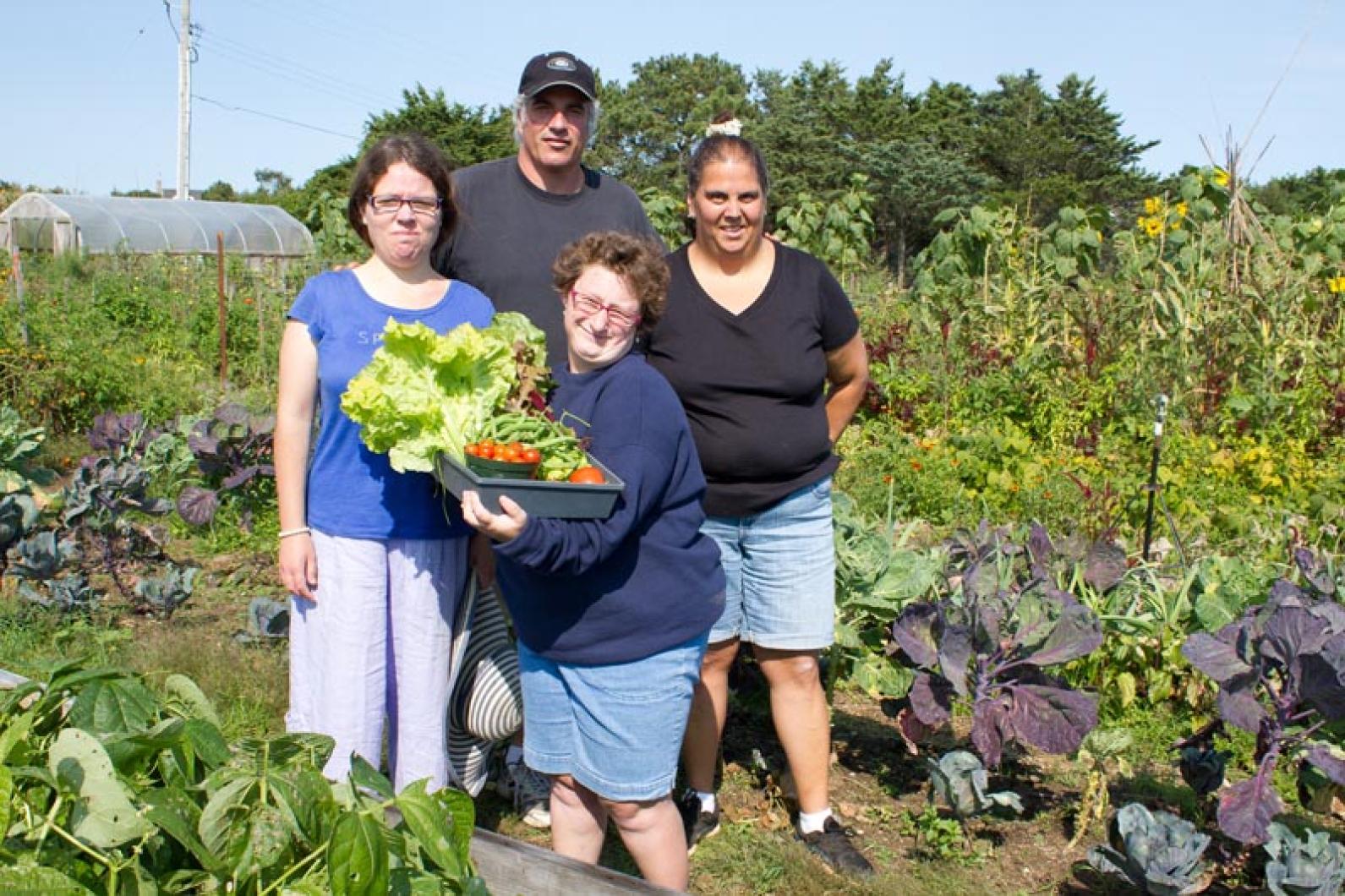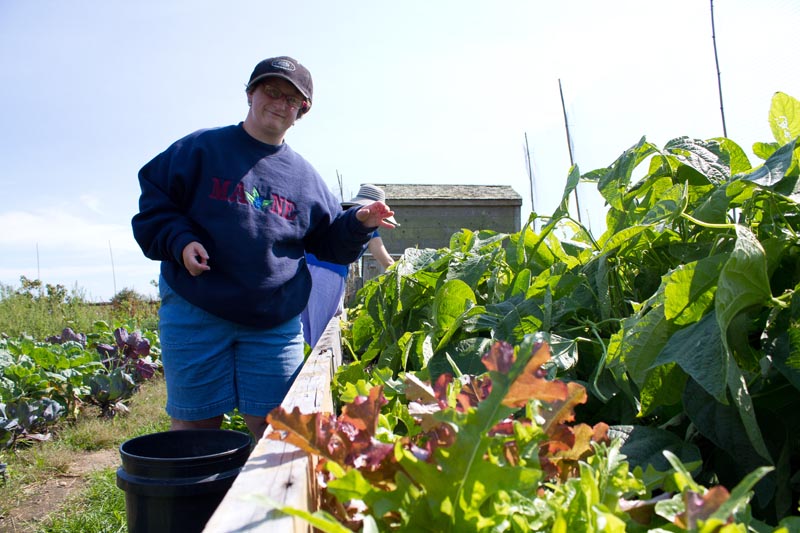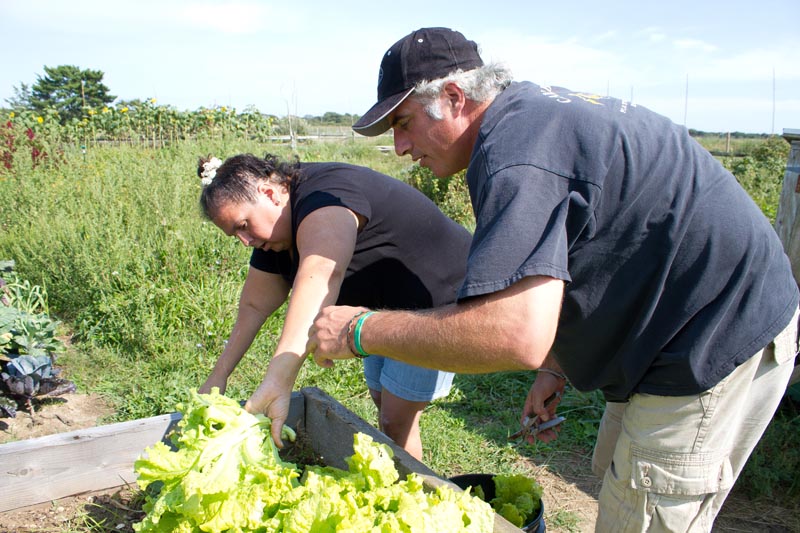In May, Richard (RJ) Cage and his two sons built a handicap ac cessible vegetable garden at the Farm Institute. They used old barn wood to create the raised bed, making sure it was tall enough for wheelchair users to be able to lean over and pick crops easily. Over the summer more than 10 participants from the Seven Hills Foundation, a year-round day program for adults with developmental disabilities, worked in the garden two to three times a week.
“I can pull the wheelchair along the side and they can pull the carrots and beets,” Mr. Cage said on a tour of the garden located within the Farm Institute’s Friendship Garden. “That was the goal of it all, to make something accessible.”
Raised on the Vineyard, Mr. Cage returned to the Island a year and a half ago after working for 20 years in Idaho with children and adults with disabilities. When he came back he started at Martha’s Vineyard Community Services part-time and eventually found his way to the Seven Hills Foundation, which has its main headquarters in Worcester, Mass., and a branch in Vineyard Haven.
Exercise, fine motor skills developed through picking vegetables and taking simple directions are all important benefits to working in a garden, Mr. Cage said. But the biggest goal is getting out into the community “so you have all the socialization that’s going on.”
Program members have been enthusiastic. Earlier this month, Channing Haggerty, Amanda Kram and Diamond (Ellie) Vanderhoop were working hard to pull the last of the radishes, beets and large heads of lettuce.
“At first it started with me showing them the ropes, and now I can just be a regular supervisor,” Mr. Cage said. “Now it’s, let’s see what they can do and look for whatever assistance they may need.”
Mr. Cage asked Ms. Vanderhoop if she’d like to go pick some more tomatoes. Her speed and efficiency quickly earned her the title of tomato queen.
“There are a few people who only last a few minutes, but for the most part we have their attention the entire time,” Mr. Cage said. “Ellie will keep picking until I say stop.”
“This whole thing depends on the individual,” he added. “That’s what our goal is, to narrow down for each individual what’s best for them.”
The “very little” Mr. Cage knows about farming comes from his grandparents, Ralph and Ethel Sherman, who with their vegetables and jams are a West Tisbury Farmers’ Market institution.
If you can’t grow anything, you can grow radishes, Grandpa Sherman advised.
“It was the first thing we planted,” Mr. Cage admitted. “Really, this is the first time I’ve done any kind of large-size gardening by myself so the fact that things grew and are happy has been quite the learning experience. My grandfather has been pretty inspiring. He’s always been pretty inspiring.”
Mr. Cage admitted it was overwhelming at times, “especially when you have five gallons of green beans.”
The lettuce section of the bed was also overflowing. Like the wood for the raised beds, this, too, was recycled in a way.
“My mom [Jackie Cage] goes to the Dumptique every Sunday and she found these lettuce seeds,” Mr. Cage said. “I went ahead and planted them and transplanted them.”
Mr. Cage’s mother runs elderly services at community services, and some of the lettuce harvested returned to the elderly through the Meals on Wheels program.
Mr. Cage hopes to firmly establish the budding relationship between Seven Hills Foundation and the Farm Institute, and the two organizations are looking for grant money to solidify the program. The educational groups working together seemed like a natural fit, he said.
“The farm has been amazing,” agreed Seven Hills director Wendy Lopez-Mata. “Everyone at the Farm Institute is so nice and welcoming and we feel a part of that community.”
The participants have taken extreme pride and ownership in what they do there, she added. “Some of the individuals we serve weren’t that big on fruits and vegetables and they’re coming back with beets they picked and they’re eating them because they grew them and picked them.”
Whenever there was a truly bountiful harvest, the Farm Institute would sell the excess produce at the farm stand.
“The kids [campers at the Farm Institute] helped with picking as well, and it was great for the 3 to 5-year-old range because it’s all at their height,” Mr. Cage said. “The only thing I asked them was to stay out of the corn. That’s ours. That’s sacred.”











Comments (1)
Comments
Comment policy »